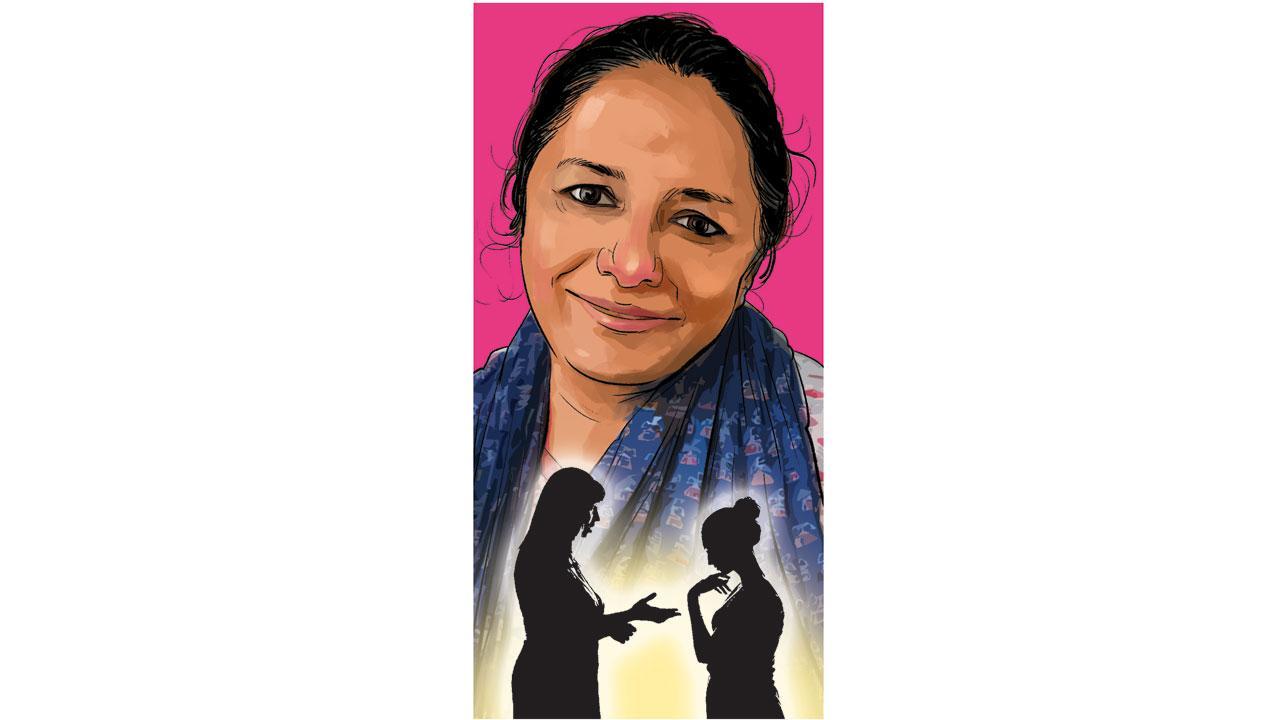I was young, overwhelmed by the city and the idea of work and nervous about saying no, so I flaked massively on getting back to her

Illustration/Uday Mohite
![]() The first time I met Chandita Mukherjee, it was for a job. She was at Natraj Studios, working on language versions of Bharat Ki Chhaap, a landmark show she created on the history of science in India, for the then single television channel Doordarshan. I was 21 and rather intimidated by her statuesque presence, her long plait, her knowledgable comments on the misal pav she was eating and the
The first time I met Chandita Mukherjee, it was for a job. She was at Natraj Studios, working on language versions of Bharat Ki Chhaap, a landmark show she created on the history of science in India, for the then single television channel Doordarshan. I was 21 and rather intimidated by her statuesque presence, her long plait, her knowledgable comments on the misal pav she was eating and the
army of very busy and professional looking women who were working with her on the project.
ADVERTISEMENT
I was young, overwhelmed by the city and the idea of work and nervous about saying no, so I flaked massively on getting back to her.
The second time I met Chandita, she gave me a scolding. I was assisting another filmmaker and ran into her while we were shooting a peace concert in a maidan somewhere in the city. She told me in forthright terms—not mean, but definitely firm—that what I had done was wrong. I was suitably ashamed. Yet I recognised, even in my foolish and shameful young way, that this scolding meant she was taking me seriously; telling me to take myself seriously, to be professional, dependable and to excel if I wanted to make something of myself in this world I’d entered. It was a strict, impersonal gesture of apnapan; an expansive act of mentorship.
In the 30 years that followed, until her death last week, I ran into Chandita everywhere—at film screenings, at art shows, at political protests, at book readings and talks. That continuous presence had a profound meaning: it signified belief and confidence in a world she had chosen to be part of and had also helped to build. A world committed to the art, ideas, learning, and the complex modernities of Indian tradition. We were part of some collectives—@Culture at the World Social Forum, the Indian Association of Women in Radio and Television and others. We did not always agree and sometimes complained about each other to our colleagues. So what? So what if you don’t agree with everyone in your community or with your friends? Community is built by witnessing something together, by being able to recognise the meaning of what someone does, not simply their success or their pleasantness.
Also read: Little lane lost
To explain why I think this is meaningful, I need to tell another story. Last year I was at a media awards event. It was invigorating to be with a large number of people, some old friends, some whose work I was newly encountering, to celebrate this extended community of ideas and political commitment to gender issues. To my consternation, most people left once they’d received their awards, not staying on for those who came after. The ceremony was long and tedious—but I wonder how people imagine they can build communities without bearing a little discomfort together.
Chandita’s commitment to media, education and social change was deep. Her smile was big. Her saris were beautiful. Her friends loved her and they shared many adventures. Her rigorous knowledge about every subject imaginable was fearsome and very extra. Her passing called up memories of mentorship across generations. Her scoldings had been many and may we count them among her achievements as acts of idealistic love and feminist comradeship. I will miss running into her everywhere.
Paromita Vohra is an award-winning Mumbai-based filmmaker, writer and curator working with fiction and non-fiction. Reach her at paromita.vohra@mid-day.com
 Subscribe today by clicking the link and stay updated with the latest news!" Click here!
Subscribe today by clicking the link and stay updated with the latest news!" Click here!







